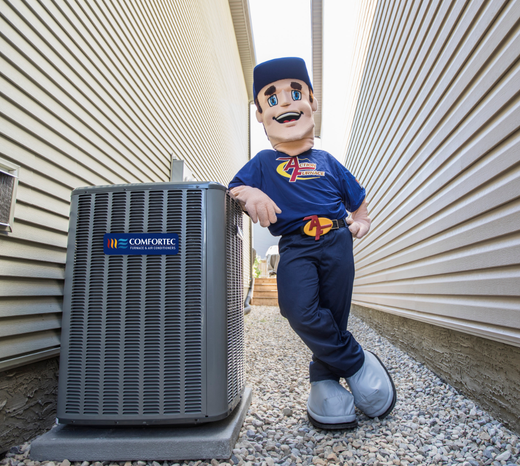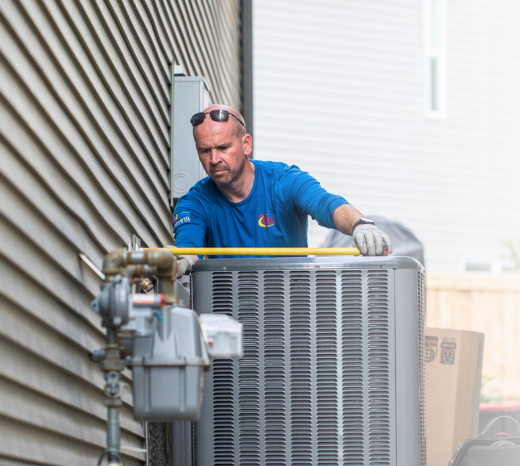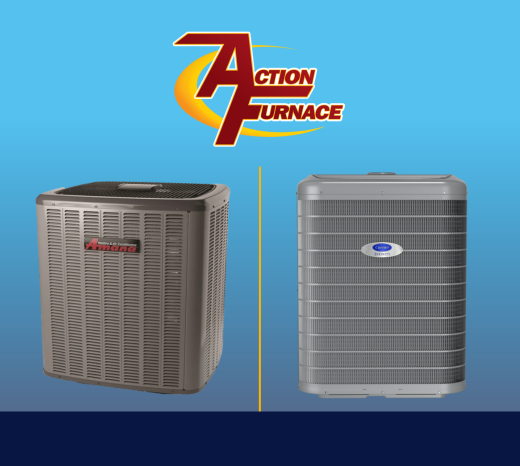As we head into another summer, our technicians are busy installing new air conditioners in homes all over Calgary and Edmonton. It’s our favourit...

As we head into another summer, our technicians are busy installing new air conditioners in homes all over Calgary and Edmonton. It’s our favourite time of year and you'll save money!
As Alberta’s largest independant heating and cooling company, we are frequently asked for tips on how to reduce energy usage. In an era of carbon taxes and increasing energy rates, looking for ways to save money is smart- we’d love to help.
It’s no secret that running an air conditioner costs money. However, how much it costs (both hourly and total) is something that can be influenced by two main variables:
- The type of air conditioner you have
- How the air conditioner is used
Choosing the Right Air Conditioner
Determine Which Type of Air Conditioner is Appropriate
Your lifestyle and cooling needs are the first things to consider when trying to determine what type of air conditioner is best. If you’re renting a room in an apartment, a window-mounted or portable air conditioner is probably sufficient; if you’re looking for something to keep your entire house comfortable, you’re looking for a central air conditioner.
- Window-mounted air conditioners are affordable, easy to install, and generally range from 5,000 BTU’s to 15,000 BTU’s. These are ideally-sized for a large room or two; to cool an entire home, you’d need several of these.
- Portable air conditioners use an exhaust hose to vent hot air from the area. This hose can easily be moved, making portable air conditioners very convenient. These units are sized similarly to window-mounted units, though are roughly twice as expensive for the same BTU rating.
- Central air conditioners - like the kinds our technicians install - connect to your home’s HVAC system. The smallest central air conditioner we carry is 12,000 BTU’s, though it is rare that we would install such a small air conditioner. Most homes need 24,000 or more BTU’s to provide appropriate cooling.
Understanding the differences between the three, when should you choose what type of unit?
- If you need to keep 1 or 2 rooms cool, use a window-mounted or portable air conditioner. These small appliances have more than enough horsepower to cool an individual room (note: an open-concept living room, or similar space, may require more than one AC to keep cool; most portable/window-mounted AC’s are good for 400-800 sq ft.
- If you need to keep an entire floor cool, such as the upper floor where the bedrooms are, you will likely need an air conditioner for each room. Depending on the size of the floor, it may save money to move to a central air conditioner.
- If you need to keep your entire home cool, your best option is a central air conditioner. Many people try to cool a 1,500+sq ft home using 2 or 3 window/portable AC’s in lieu of a central air conditioner. However, this approach is expensive (it costs more per hour to run multiple small AC’s vs. a more efficient central air conditioner), loud, and clunky.
The Right Size of Air Conditioner is Critical
True for both portable/window mounts and central units, air conditioner size plays a significant role in their cooling and cost efficiency.
- A big air conditioner in a small space is overkill - If you only have a single 150 sq ft room to cool, purchasing a 15,000 BTU portable air conditioner is the equivalent of using a sledgehammer to put a nail in the wall.
- A small air conditioner in a big room is a disaster - Nevermind the fact that the AC will be forever running to maintain the desired temperature, but you’ll also have maintenance/wear concerns to consider (a unit can only hit above its pay grade for so long).
- Air flow throughout your home plays into this - Your main floor may only be 800 sq ft, and thus seemingly a great fit for a large portable AC, but if it’s an open concept where air can easily escape upstairs and down, your air conditioner will have to work harder to compensate.
The above points speak directly to window/portable AC’s, but they are also appropriate for a central air conditioner. This is why our estimators visit your home in-person before providing a quote on a new air conditioner- we want to ensure that the AC we are installing is the right size and type for your needs/home.
Tips to Help Your Air Conditioner Operate at Peak Efficiency
Seal & Insulate Your Home’s Envelope
One effective way to improve air conditioning (and heating) efficiency is to minimize sources of airflow leaks and maximize heat retention.
- Ensure that all weather stripping surrounding windows and doors is in good repair and that no leaks/drafts are present. Reducing air lost to the environment minimizes the volume of air that needs to be heated/cooled, thus lowering the energy required to reach and maintain a comfortable temperature.
- Insulate wherever possible. It is easier to maintain a consistent temperature than it is to have to constantly heat/cool the air. Insulation is an inexpensive, passive, and effective way to save money.
Ensure the Air Conditioner is in Good Repair
True of both window/portable and central units, a unit operating in good repair is going to cost less than a unit in need of service.
- Ensure the condenser has ample airflow. For central units, this is the box/fan outside; for portable/window units, this is the area behind the AC that is vented. Make sure that the unit has good airflow, is not obstructed (by debris, dirt, or anything else), and that exhaust air is able to easily move away from the unit.
- Check all filters and make sure they’re clean. A dirty filter restricts incoming airflow, reducing efficiency of the entire unit considerably.
- Poorly lubricated fans/motors take more energy to operate, increasing costs while decreasing performance.
If you have a central unit, we can help! Learn more about our air conditioner repair services.
Reduce “Cycling” as Much as Possible
It is natural to assume that leaving the AC off, and only turning it on when you absolutely need ito, is the ideal way to reduce bills. This is true in the literal sense, but in application the waters tend to get muddied.
It costs more to significantly change temperature vs. maintain temperature. If you intend on running your AC in a single room, running the AC continuously throughout the day (even when you aren’t home) may not be wise. However, if your entire home needs to be kept cool, it is better to run it on a set schedule vs. turning it on and off frequently.
Use a Smart Thermostat
If you’re running a central air conditioner, a smart thermostat - such as the Nest or Ecobee - can significantly lower utilities and save money. According to Global News, this can be by as much as 15%.



